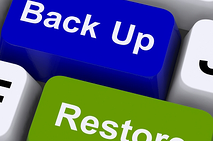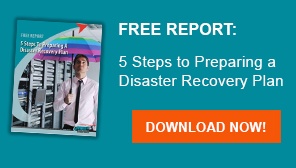Data Backup Technologies for your small business
 This month I am going to focus on your company’s data backups/data restoration and the importance of protecting your company data. When you take a moment to consider the various data backup solutions, it is easy to recognize there are a number of different data backup technologies. From traditional tapes to on premises disk and data-streaming to the cloud; it can be a challenge to figure out what you need. Let’s take a look at the three main approaches to data backup services with the hopes of helping you choose which one is right for your company.
This month I am going to focus on your company’s data backups/data restoration and the importance of protecting your company data. When you take a moment to consider the various data backup solutions, it is easy to recognize there are a number of different data backup technologies. From traditional tapes to on premises disk and data-streaming to the cloud; it can be a challenge to figure out what you need. Let’s take a look at the three main approaches to data backup services with the hopes of helping you choose which one is right for your company.
Three common data backup media types
When it comes to backing up your IT systems, there are three common technology media types that are used:
- Cartridge Tapes
- Disk Drive Arrays
- Off Site Cloud
Some businesses use all three, while others stick to using just one or two. While each of these technologies deliver the same result - backing up your data - there are distinct differences between each media type.
Cartridge Tape data backups
Cartridge Tape-based backup is the oldest forms of data backup available to businesses, and has been in use since the 1960s. All large mainframe data centers relied on tape for decades; from large reels, to the more modern cartridge tape assemblies. While tape media may seem a little anachronistic, there are still manufacturers creating backup tapes. Sony recently introduced a new tape system that can store up to 185 TB (terabytes) of data on one tape. That's about equal to the storage capacity of approximately 11,800 16GB iPads.
The vast majority of businesses using tape do so as a secondary backup. They use another system to back up their data, and then back up this backup data onto physical tape which can then be moved off-site and stored in a safe location, should disaster strike. When the tapes are left on-site the business loses the greatest advantage of tape, which is portability.
There are two serious drawbacks to tape data backups which must be accounted for. The first issue is that it takes longer to back up data to tape than it does to a disk. So if you have a lot of data to backup, often, tape is not an option because you don’t have a large enough back-up window to get all of your data on a tape. And the second issue; the tapes themselves are also more fragile and can be prone to failure, leading to corrupt data and unreadability. This mechanical failure of tape cartridges forces a small business to always test the viability of their tape backups, otherwise, you might be inclined to use a tape for year, and when a failure actually occurs and you go to restore your data from the untested tape cartridge, you discover the tape copy is no longer viable to recover your data.
Finally, if you do need to recover from a tape backup, you are going to have to do so in a specific manner, which means it will take longer to recover your systems than using disk backups. Typically you need to read a few tapes in a specific order to recover a whole server: its applications and data.
Disk Drive Data backups
Disk-based backup solutions use a variety of sizes and styles of disk storage units to copy, archive and recover backups of your data. The most popular forms of disk storage used are hard drives, often, connected through software into an array. Because these systems use more modern storage methods, backup and recovery can generally be carried out far quicker than with tape systems, and can be more reliable, especially if you take care of your systems and the disks the backups are stored on. The added benefit with these systems is that hard disks are constantly dropping in price and increasing in capacity, meaning you can fit more data on fewer devices. This helps keep costs manageable, and may result in reduced costs over time.
Because disk-based systems are picky about their environment, it is not common to move these devices off site. So many small businesses will deploy a disk array for local high speed copies and recovery, but in the event of a flood or a fire, the data needs to get offsite. That’s where tape or cloud storage can come into play. To get around this, many companies have duplicate systems. They back up to different devices which are kept off-site. This redundancy can help ensure that your data is available, but much like business insurance, it can be expensive to purchase multiple backup solutions.
Off Site Cloud data backups
Cloud solutions are becoming popular because they are inexpensive, and they help a business owner regularly get their company data out of their office. Cloud, or streaming data backup, utilizes off-site technology to host your backups in a remote and secure data center. Most small business solutions work with data backup service providers who host the backup servers in the cloud and the business then connects their servers via a secure network connection to the Cloud storage facility.
The biggest advantage of cloud systems is that they are generally inexpensive and much more reliable than tape. This is because you don't need to have the systems in your office, which means you don't need to pay for the data systems and the upkeep associated with them. Cloud systems are also less labor intensive because they can be managed by your IT service partner. Aside from being easier to manage, backup and recovery is usually quicker with the cloud because you can set up a solution that continually backs up your data. As long as you have an Internet connection, you will usually be able to restore your systems in a matter of hours.
While the cloud is becoming the most popular backup solution, there are some drawbacks. You need a higher bandwidth Internet connection if you want to be able to back up while also working. This may require you to invest in a better network infrastructure.
Each data backup technology has its place. Each data backup approach will work, although one is often more appropriate than another. If you are considering reviewing or creating a data backup plan and need some help you can reach out to us at ANP. Or if you might be ineterested in outsourcing your data backup service to an IT service provider like ANP, please dont hesitate to call us. Would you like to learn more about ANP's data backup solutions which are either in your office or in our data center, click here. ANP is also offering a 30 minute free webinar regarding data backup and what every CEO should know about thier data backup, register here. Or if you are not ready to meet or talk, you may download these two great white papers regarding data backup:


